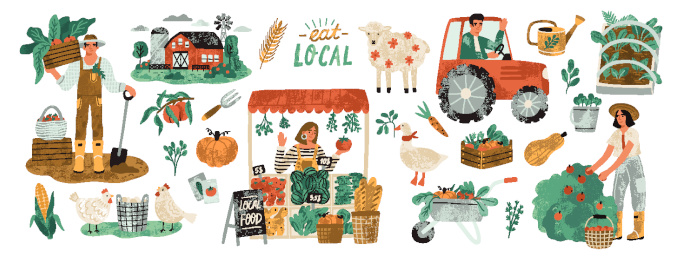
A Preview:
"How might we begin to build a decentralized system of durable local economies? Gradually, I hope. We have had enough of violent or sudden changes imposed by predatory interests outside our communities. In many places, the obvious way to begin the work I am talking about is with the development of a local food economy. Such a start is attractive because it does not have to be big or costly, it requires nobody’s permission, and it can ultimately involve everybody. It does not require us to beg for mercy from our exploiters or to look for help where consistently we have failed to find it. By “local food economy” I mean simply an economy in which local consumers buy as much of their food as possible from local producers and in which local producers produce as much as they can for the local market." ~ Wendell Berry, “Conserving Communities”
By Pete Kennedy, Host of the Solari Food Series
During these chaotic times, a major challenge for most of us will be having access to quality food and being able to exercise the right to obtain the food of our choice from the sources of our choice. Crucial to protecting this right are laws that deregulate food production and distribution—especially laws that allow for the unregulated sale of food direct from local producers to consumers. Unregulated sales from farmer to consumer were long part of this country’s rural tradition, but something started changing in the 20th century when federal and state legislation ensnared family farmers in a regulatory scheme created due to problems that were not of the farmers’ own making.
In recent years, most of the success in creating legal protection for unregulated direct food commerce has occurred at the state level, but there is a big exception to that trend—Maine. In that state, over 80 towns have passed the Local Food and Community Self-Governance Ordinance (LFCSGO), a model ordinance allowing unregulated direct sales from producers to consumers within the boundary of localities that have passed the LFCSGO.
Unassuming, respectful but very persistent, and not afraid to push the envelope, Heather Retberg was instrumental in the passage of the 2017 Maine Food Sovereignty Act, a landmark bill giving the state’s towns and cities the power to preempt conflicting state legislation with the passage of ordinances allowing unregulated local producer-to-consumer commerce. Prior to the 2017 law, 20 towns had already passed the LFCSGO, even though there was likely not a court in the state that would have ruled that those ordinances controlled over any conflicting state regulations. Retburg was at the center of forcing the issue of local food autonomy, eventually convincing the state legislature to recognize food sovereignty town by town.
In this week’s interview, Retberg talks about the tremendous progress Maine food sovereignty has made, the obstacles it has overcome along the way, and what others elsewhere can do to achieve similar successes.
In Let's Go to the Movies this week, I recommend Rally 3 – Farmer Heather Leads the Way, recorded in November 2011 when the state of Maine prosecuted Dan Brown, a farmer with only one cow, for selling raw milk—a challenge by the Maine Department of Agriculture to the food sovereignty ordinance passed by the town of Blue Hill. In support of food sovereignty and in recognizing the state’s lawsuit as an assault on the rights of both farmers and consumers, we can say, “We are all Farmer Brown.”
Post your questions for Ask Catherine and story suggestions for Money & Markets for this week here.
Related Resources:
From the Preamble to the Local Food Community Self-Governance Ordinance (LFCSGO)
We, the People of the Town have the right to produce, process, sell, purchase, and consume local foods thus promoting self-reliance, the preservation of family farms, and local food traditions. We recognize that family farms; sustainable agricultural practices; and food processing by individuals, families, and non-corporate entities offer stability to our rural way of life by enhancing the economic, environmental, and social wealth of our community. As such, our right to a local food system requires us to assert our inherent right to self-government. We recognize the authority to protect that right as belonging to the Town.
We have faith in our citizens’ ability to educate themselves and make informed decisions. We hold that certain federal and state regulations unnecessarily impede local food production and constitute a usurpation of our citizens’ right to foods of their choice. We support food that fundamentally respects human dignity and health; nourishes individuals and the community; and sustains producers, processors, and the environment. We are therefore duty bound under the Constitution of the State of Maine to protect and promote reasonably unimpeded access to local foods.
All individuals have a natural, inherent, and unalienable right to acquire, produce, process, prepare, preserve, and consume the food of their own choosing for their own nourishment and sustenance. Furthermore, all individuals have a right to barter, trade, and purchase food and to save and exchange seed from the sources of their own choosing for their own physical health and well-being. Every individual is fully responsible for the exercise of these rights, which may not be infringed. Read More
Remedy for Slaughterhouse Logjam?
“Conserving Communities” by Wendell Berry
Organizing for Food Sovereignty
Food for Maine’s Future (Facebook page)
Farm-to-Consumer Legal Defense Fund
